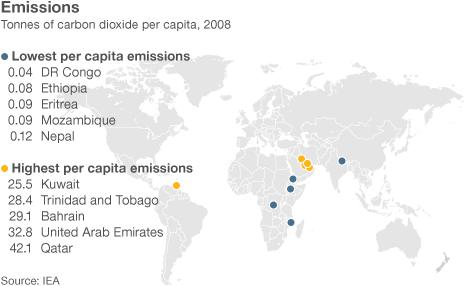Extreme World: Pollution
- Published

The penultimate part of our Extreme World season will focus on the environment.
In recent years politicians across the globe have begun to focus on how to tackle problems such as pollution and climate change.
A new report from the UN Environment Programme (Unep) concludes there is a significant gap between what science says is necessary to constrain temperature rise and what governments have pledged to achieve.
The global economic crisis has led to a fall in carbon emissions - but only by 1.3% during 2009 - and Unep warns they are likely to rise again as the economy picks up pace.
Figures from the International Energy Authority show the US and China still leading the world with the biggest emissions of CO2 - 5.6 and 6.5 million tonnes respectively - while only the less developed African countries like DR Congo and Senegal and some former East European nations have little or no emissions.
However, carbon emissions per capita tell a slightly different story - several Middle Eastern countries produce the highest emissions per capita - with Qatar leading the way with 42.09 tonnes per capita.
Trinidad and Tobago is number five on the list with per capita emissions of 28.4 tonnes. Emissions have soared in recent years, partly due to increased power generation and partly from industrial sources.
Iceland leads the world in using renewable sources for fuel - yet it is also the world's second biggest consumer of oil per head, behind Qatar.